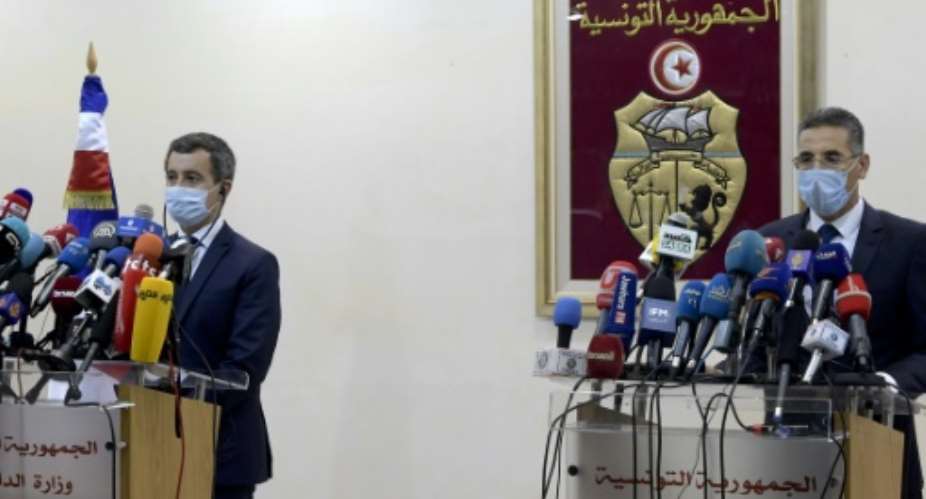Tunisia is willing on certain conditions to take back its nationals expelled from France, the interior minister said Saturday, after talks with his visiting French counterpart on measures against Islamist radicalisation.
The former French colony is "prepared to receive any Tunisian", Taoufik Charfeddine said at the end of a visit by Gerald Darmanin, following a deadly attack in Nice last month allegedly carried out by a Tunisian jihadist.
"But this must be done in line with conditions and regulations" under international laws and conventions, and "preserving the dignity of the Tunisian" being returned, Charfeddine told reporters.
The French interior minister also met with Tunisian President Kais Saied.
Sources close to Darmanin said ahead of the talks that he would submit to authorities a list of some 20 Tunisians who France wants to expel, on the basis that they had been convicted on terrorism charges or were suspected of jihadist inclinations.
The French interior minister is due to visit Algeria on Sunday on a similar mission.
Public opinion in Tunisia is hostile towards the return of suspected jihadists, and authorities have refused the return of their citizens from France on the basis of travel restrictions linked to the coronavirus pandemic.
Tunisian nationals have constituted a significant proportion of foreign jihadists in Syria, Iraq and Libya over the past decade.
In 2015, the United Nations said that some 5,000 Tunisians had flocked mainly to Syria and Libya to join the Islamic State group (IS), while authorities in Tunis gave a lower figure of 3,000.
Their return has been a cause of concern in Tunisia, which has been under a state of emergency following a string of IS-claimed attacks in 2015 and 2016.
Sources close to Darmanin say that 70 percent of over 230 foreigners illegally in France and suspected of radicalism are from the Maghreb region, which includes Tunisia and Algeria, and from Russia.
His visit to Tunis was scheduled some time ago, but it takes on new urgency following the October 29 killing of three people at a church in the southern French city of Nice.
The alleged perpetrator of that attack, 21-year-old Brahim Aouissaoui, who arrived illegally in Europe in late September, is not the first Tunisian suspected of carrying out a deadly jihadist attack in Europe.
In 2016, 31-year-old Mohamed Lahouaiej-Bouhlel ploughed a truck into a Bastille Day crowd on the Nice seafront, killing 86 people.
Later that year fellow Tunisian citizen Anis Amri, 24, carried out a similar attack at a Berlin Christmas market, killing 12 people.
IS claimed both men as its followers.
burs-cnp/hkb/pjm





 We’ll protect state wealth from opaque deals – Prof Jane Naana
We’ll protect state wealth from opaque deals – Prof Jane Naana
 Mauritania president says running for second term in June polls
Mauritania president says running for second term in June polls
 I won't ever say I was a mere driver’s mate' — Prof. Opoku-Agyemang
I won't ever say I was a mere driver’s mate' — Prof. Opoku-Agyemang
 2024 polls: 'EC struggling to defend credibility'— Prof. Opoku-Agyemang
2024 polls: 'EC struggling to defend credibility'— Prof. Opoku-Agyemang
 Akufo-Addo gov't's 'greed, unbridled arrogance, unrestrained impunity, sheer dis...
Akufo-Addo gov't's 'greed, unbridled arrogance, unrestrained impunity, sheer dis...
 Election 2024: Ghana needs an urgent reset, a leadership that is inspiring – Ma...
Election 2024: Ghana needs an urgent reset, a leadership that is inspiring – Ma...
 Partner NDC to rollout a future of limitless prospects – Prof Jane Naana Opoku-A...
Partner NDC to rollout a future of limitless prospects – Prof Jane Naana Opoku-A...
 NPP will remain in gov’t till Jesus comes — Diana Asamoah
NPP will remain in gov’t till Jesus comes — Diana Asamoah
 Sunyani Technical University demands apology from former SRC president over sex-...
Sunyani Technical University demands apology from former SRC president over sex-...
 'Dumsor' was resolved by Mahama but ‘incompetent' Akufo-Addo has destroyed the g...
'Dumsor' was resolved by Mahama but ‘incompetent' Akufo-Addo has destroyed the g...
